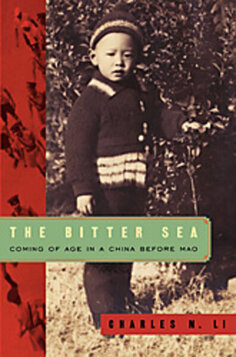In China, Hoping for
a Father’s Love
How a father’s ambition and the rise of Communism took precedence over
family.
a Father’s Love
How a father’s ambition and the rise of Communism took precedence over
family.
February 26, 2008
By Ying Chang Compestine
By Ying Chang Compestine
As someone born and raised in Communist China, I was captivated by Charles Li’s first-hand account of the tumultuous events that define the history of modern China.
A Bitter Sea: Coming of Age in a China Before Mao traces the early life of Li Na (the author’s Chinese name), beginning in the late stages of World War II on through to the complete domination of mainland China by its Communist overlords.
But Li’s memoir is not just an account of a turbulent period of Chinese history. It is also the heart-rending story of a father-son relationship in which ambition proves more powerful than love.
For the first half of the book, the fortunes of father and son travel in opposite arcs. During the Japanese occupation of China, Sheng-wu, Li Na’s father is at the height of his power, working as a minister in the collaborationist government. But throughout this period the son is miserable, penned up in the family mansion with no playmates and no freedom.
When the Japanese are ousted and his father is locked up by the Nationalists, Li Na gains freedom and camaraderie when his mother moves the family into the Nanjing slum. An outcast for much of his life, Li Na experiences the year spent in the slum as the happiest in his childhood — despite disease, poverty, and danger — because there he finds a tight-knit collection of loyal friends.
The arrival of the Communist army in Shanghai
But then Li Na is sent to live with his spinster aunt in Shanghai. He remains there for four years, where he witnesses the spiraling collapse of the brutal and incompetent Nationalist government. In one horrifying scene, firemen extort money from the tenants of a burning apartment building before putting out the flames.
Li Na describes the arrival of the ragtag Communists in Shanghai as surprisingly civil. Poorly armed but tightly disciplined, the Communists act quickly to dispel the chaos left by the Nationalist retreat. It’s not long before the brutal regimentation of life under the Communists leads Li Na and his aunt to flee to Hong Kong, where Sheng-wu has been exiled. There, Li Na is reunited with his parents.
The early days in Hong Kong are bitter for the boy. His father seems distant and cruel — a man he barely knows. With time, however, the bitterness between father and son dissipates and they seem to reach a new understanding. Always active, with a brilliant and curious mind, Li Na rises to the challenge of Hong Kong’s fiercely competitive secondary school system, and later delves passionately into a broad range of topics at a post-secondary school.
Yet the apparent calm is deceiving. Sheng-wu’s political ambition knows no bounds.
“A Bitter Sea” is not just a book about Li Na’s coming of age in a China, but also about the two previous generations of the Li family. However, the more the reader learns about the Li family, the more difficult it becomes to fathom Sheng-wu.
When he, in his own youth, decided to take the college entrance exam rather than work to support his family, it was considered a terrible act of rebellion and created a deep family rift. Later, however, he expects nothing but unquestioning loyalty from Li Na. At one point, he tells Li Na, “A father need not consult his son on what he does or what he plans. If I prosper, you will benefit. If I fail, you will suffer. It’s the rule of life!”
Li Na spends most of his teen years seeking his father’s love and approval. He is willing to do anything to achieve this. After he graduates from a prestigious high school in Hong Kong, Li Na agrees to return to Communist China to attend preparatory school — something Sheng-wu desires as a means of testing the political waters for himself. As he sees no political future for himself in either Hong Kong or Taiwan, he uses his son to learn about conditions back in mainland China.
Back in Mao’s China
Having experienced life in Communist China under Mao, I couldn’t help but call out, “Oh, no!” as I read of Li Na crossing the border.
Upon entering China, he’s greeted by a cadre member and escorted to a “reform school” where he is to be reeducated in political thought, as well as prepared for the entrance exam. The living conditions he describes at the school are reminiscent of my own college dorm experiences a generation later — crowded dorm rooms, no heat or air conditioning, unbearable bathrooms, poor diet, “self-criticism and mutual criticism” sessions, and endless hours of political study. Above all, there are the fanatical political officers who watch every move and hold the fate of the students in their hands.
In the reform school, Li Na takes us into the “Campaign to Exterminate the Four Pests” and the monstrous insanity of Mao’s policies as the entire nation of China grinds to a halt to spend four days swatting flies.
Li Na is finally able to leave China and, as he does, to withdraw from his father. With his mother’s help, he becomes a student in America, where today he works as a professor of linguistics at the University of California, Santa Barbara.
Li Na’s story overlaps with so much of the drama of modern China that it provides a compelling firsthand view of history. But in the end, what readers will find most haunting is the story of a boy betrayed by both his father and his country.
• Ying Chang Compestine is the author of 'Revolution Is Not a Dinner Party.'
A Bitter Sea: Coming of Age in a China Before Mao traces the early life of Li Na (the author’s Chinese name), beginning in the late stages of World War II on through to the complete domination of mainland China by its Communist overlords.
But Li’s memoir is not just an account of a turbulent period of Chinese history. It is also the heart-rending story of a father-son relationship in which ambition proves more powerful than love.
For the first half of the book, the fortunes of father and son travel in opposite arcs. During the Japanese occupation of China, Sheng-wu, Li Na’s father is at the height of his power, working as a minister in the collaborationist government. But throughout this period the son is miserable, penned up in the family mansion with no playmates and no freedom.
When the Japanese are ousted and his father is locked up by the Nationalists, Li Na gains freedom and camaraderie when his mother moves the family into the Nanjing slum. An outcast for much of his life, Li Na experiences the year spent in the slum as the happiest in his childhood — despite disease, poverty, and danger — because there he finds a tight-knit collection of loyal friends.
The arrival of the Communist army in Shanghai
But then Li Na is sent to live with his spinster aunt in Shanghai. He remains there for four years, where he witnesses the spiraling collapse of the brutal and incompetent Nationalist government. In one horrifying scene, firemen extort money from the tenants of a burning apartment building before putting out the flames.
Li Na describes the arrival of the ragtag Communists in Shanghai as surprisingly civil. Poorly armed but tightly disciplined, the Communists act quickly to dispel the chaos left by the Nationalist retreat. It’s not long before the brutal regimentation of life under the Communists leads Li Na and his aunt to flee to Hong Kong, where Sheng-wu has been exiled. There, Li Na is reunited with his parents.
The early days in Hong Kong are bitter for the boy. His father seems distant and cruel — a man he barely knows. With time, however, the bitterness between father and son dissipates and they seem to reach a new understanding. Always active, with a brilliant and curious mind, Li Na rises to the challenge of Hong Kong’s fiercely competitive secondary school system, and later delves passionately into a broad range of topics at a post-secondary school.
Yet the apparent calm is deceiving. Sheng-wu’s political ambition knows no bounds.
“A Bitter Sea” is not just a book about Li Na’s coming of age in a China, but also about the two previous generations of the Li family. However, the more the reader learns about the Li family, the more difficult it becomes to fathom Sheng-wu.
When he, in his own youth, decided to take the college entrance exam rather than work to support his family, it was considered a terrible act of rebellion and created a deep family rift. Later, however, he expects nothing but unquestioning loyalty from Li Na. At one point, he tells Li Na, “A father need not consult his son on what he does or what he plans. If I prosper, you will benefit. If I fail, you will suffer. It’s the rule of life!”
Li Na spends most of his teen years seeking his father’s love and approval. He is willing to do anything to achieve this. After he graduates from a prestigious high school in Hong Kong, Li Na agrees to return to Communist China to attend preparatory school — something Sheng-wu desires as a means of testing the political waters for himself. As he sees no political future for himself in either Hong Kong or Taiwan, he uses his son to learn about conditions back in mainland China.
Back in Mao’s China
Having experienced life in Communist China under Mao, I couldn’t help but call out, “Oh, no!” as I read of Li Na crossing the border.
Upon entering China, he’s greeted by a cadre member and escorted to a “reform school” where he is to be reeducated in political thought, as well as prepared for the entrance exam. The living conditions he describes at the school are reminiscent of my own college dorm experiences a generation later — crowded dorm rooms, no heat or air conditioning, unbearable bathrooms, poor diet, “self-criticism and mutual criticism” sessions, and endless hours of political study. Above all, there are the fanatical political officers who watch every move and hold the fate of the students in their hands.
In the reform school, Li Na takes us into the “Campaign to Exterminate the Four Pests” and the monstrous insanity of Mao’s policies as the entire nation of China grinds to a halt to spend four days swatting flies.
Li Na is finally able to leave China and, as he does, to withdraw from his father. With his mother’s help, he becomes a student in America, where today he works as a professor of linguistics at the University of California, Santa Barbara.
Li Na’s story overlaps with so much of the drama of modern China that it provides a compelling firsthand view of history. But in the end, what readers will find most haunting is the story of a boy betrayed by both his father and his country.
• Ying Chang Compestine is the author of 'Revolution Is Not a Dinner Party.'
Find this article at The Christian Science Monitor






